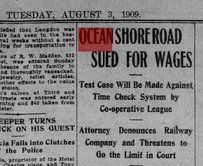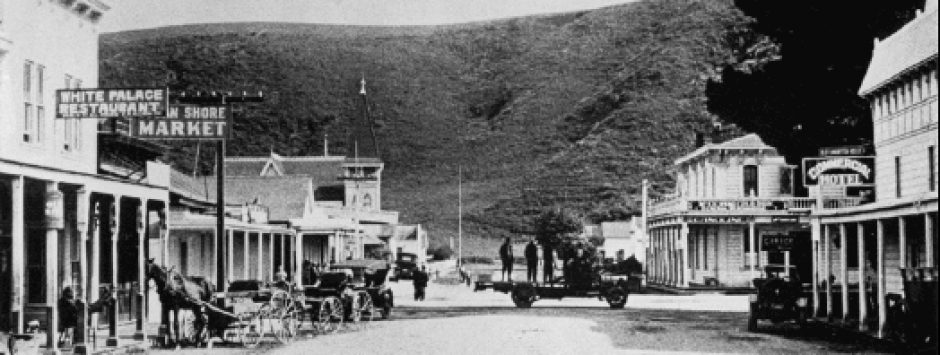
Story from John Vonderlin
Email John ([email protected])
Hi June,
Here’s an article that has a little piece of the complex puzzle of why the Ocean Shore Railroad failed. I was happy to see the employees of the Unemployed co-operative league, my favorite union, getting involved in this, no matter the irony.
My guess is this story is more complex then the plaintiff’s lawyer asserts. With few banks, little literacy(signed with an X) and a “Wild West” scene at the labor camps with saloons, gambling, extortion, prostitution, and violent crime, having paychecks become legal tender is problematic. And how Mr. Genatto, the “humblest citizen,” the man who did the hard work, is protected by Mr. Backus being able to cash his check, I’m not quite sure. He may may have accepted it for gambling losses, a night’s drunken binge-ing or other misguided pleasureseeking.
On the other hand, after working a long, hard day at a dangerous job, to have the company make me wait until I could go to San Francisco, (or HMB) to get that whole dollar I earned, burning a hole in my pocket, might irritate workers hankering to spend it on some of the fine entertainment I mentioned..
I will agree with the lawyer that earning $1 a day, for backbreaking dangerous work, makes one a member of the “humblest citizen” class. But, ironically, those humblest of citizens, at least got fully paid, unlike almost all of the investors and many of the contractors and suppliers of the Ocean Shore Railroad. Enjoy. John
OCEAN SHORE ROAD
SUED FOR WAGES
Test Case Will Be Made Against
Time Check System by
Co-operative League
Attorney Denounces Railway
Company and Threatens to
Go the Limit in Court
As a test case in the campaign
against the time – check system, – suit
was filed in the justice court yesterday
by Backus, a member of the Unemployed
co-operative league against the Ocean
Shore railway company for a claim
of $29.50.
The time check was .made payable
to^ A. A Genatto, a laborer, and after
passing through .various hands was as-
signed finally to Backus, who declared
in his complaint, that he was unable to
collect. The check, according to the
data on its face, was payable April 15,
1909, for 30 days’ work, done, during
the month of December 1908, at the
rate of $1 a-day. Of the total amount
50 cents was deducted for hospital
service. (What! no health care benefits?)
Attorney G.B. Benham, representing
the plaintiff, said that the case was a
test one. “We are anxious to find out,”
he said, “by what right these firms
refuse to pay their workmen, and
whether or not they have a legal
ground for their action. This is the
first case and it will be followed by
scores: of others.”
Backus, was emphatic in his denun-
ciation. “The present instance,” he
said, “is one of many, but it has been
selected for prosecution because of its
aggravated character. We propose to
go the limit in showing up this corporation,
which has always received generous
treatment from. San Francisco and
which is guilty of such inhumanity to
one of its humblest citizens.”
